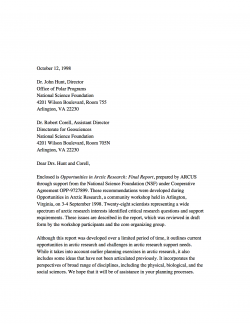Download Report
Opportunities in Arctic Research: Final Report

At the request of the National Science Foundation's Office of Polar Programs, the Arctic Research Consortium of the United States (ARCUS) organized a community workshop, Opportunities in Arctic Research, which was held in Arlington, Virginia on 3-4 September 1998. Twenty-eight scientists participated in the workshop, representing a wide spectrum of arctic research interests. Participants identified critical research questions and support requirements. These issues are outlined in the accompanying report, which has been reviewed by the workshop participants and the core organizing group.
Workshop participants and ARCUS appreciated the opportunity to develop planning recommendations for NSF. We also appreciated the information presented by Drs. Colwell, Hunt, and Pyle that helped to clarify our charge and the context in which this planning process is being conducted. NSF staff added much valuable information in the course of the workshop deliberation.
Dear Colleague:
The report to the National Science Foundation on Opportunities in Arctic Research is now available.
These recommendations were developed during a community workshop held in Arlington, Virginia, on 3-4 September 1998. Twenty-eight scientists representing a wide spectrum of arctic research interests identified critical research questions and support requirements. The discussion and subsequent recommendations are described in Opportunities in Arctic Research: Final Report. The report, which was reviewed in draft form by the workshop participants and the core organizing group, was prepared by ARCUS through support from the National Science Foundation (NSF) under Cooperative Agreement OPP-9727899.
The NSF invited the arctic research community to engage in this effort in order to aid the Foundation's planning process and ability to respond rapidly to the budget increases in the FY99 Congressional appropriation. (See Witness the Arctic, Autumn 1998, vol. 6, no. 2; page 10 for more information on the federal research budget and page 11 for the opening remarks delivered by the Director of NSF at the Arctic Opportunities workshop). The final report from the workshop was prepared under a stringent deadline because the results of these deliberations were important for discussions and planning processes initiated at the beginning of the federal fiscal year (October 1998).
The report outlines current opportunities in arctic research and challenges in arctic research support needs. A distinctive feature of this report is that it attempts to balance inputs and perspectives provided by the physical, biological and social science communities. While it takes into account earlier planning exercises in arctic research, it also includes some ideas that have not been explicitly articulated previously, such as defining NSF's possible role in contaminant studies, the importance of long-term observations and monitoring as a foundation for basic research in the Arctic, and the significance of the Arctic in high atmosphere studies. The report also stresses the need for integrated research approaches to study change in the Arctic and to improve our understanding of the links between physical and biological phenomena and socioeconomic changes.
Community discussion on these issues will continue to be very important and we encourage you to contact us with your thoughts on the issues discussed in this report.
Signed,
Peter Schlosser, co-chair, Lamont-Doherty Earth Observatory (LDEO), Columbia University
John Walsh, co-chair, Department of Atmospheric Sciences, University of Illinois-Urbana
Tom Pyle, Arctic Section Head, NSF Office of Polar Programs
